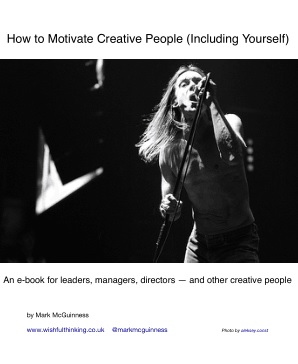
|
FreeComputerBooks.com
Links to Free Computer, Mathematics, Technical Books all over the World
|
|
- Title How to Motivate Creative People (Including Yourself)
- Author(s) Mark McGuinness
- Publisher: Wishful Thinking (2009)
- Lic ense(s): Attribution-NonCommercial-NoDerivs 2.0 UK: England & Wales (CC BY-NC-ND 2.0 UK)
- Paperback N/A
- eBook HTML and PDF (58 pages, 1.8 MB)
- Language: English
- ISBN-10: N/A
- ISBN-13: N/A
- Share This:

|
An e-book for leaders, managers, directors, and other creative people. It will help you: understand how motivation affects creativity, get better work out of creative people, avoid crushing people's motivation, use rewards effectively, understand and influence many different types of people, facilitate creative collaboration.
- What makes creative people tick
- Why motivation is crucial to creative success
- Why you can't motivate anybody - but what you can do instead
- What Iggy Pop can teach you about management
- Why offering rewards can harm creative performance
- How to write 47 novels before breakfast
- Why some people seem so weird - and how to deal with them
- The positive side of peer pressure
- Mark McGuinness is a poet, a coach for creative professionals, and the host of The 21st Century Creative Podcast.
 Similar Books:
Similar Books:
-
 Motivation: How To Enjoy It Every Day (David Valois)
Motivation: How To Enjoy It Every Day (David Valois)
21 Secrets To Get Motivated - Even If You Are In The Most Difficult Situation! Do you want to know what do high motivated achievers that others don't? Then you need MOTIVATION. And here you will discover how.
-
 Mind Hacking: How to Change Your Mind for Good in 21 Days
Mind Hacking: How to Change Your Mind for Good in 21 Days
Teaches you how to reprogram your thinking - like reprogramming a computer - to give you increased mental efficiency and happiness. Learn to take charge of your mind and banish negative thoughts, habits, and anxiety - in just 21 days!
-
 Mind Relief Manuscript (Jerry Stocking)
Mind Relief Manuscript (Jerry Stocking)
In this book, the author's simple tricks and exercises that will allow you to quiet your mind, reduce stress and think clearly. You will access mental flexibility and deep inner peace while reading through this fast fun book, guaranteed to lighten your day!
-
 Finding Your Power to Be Happy: Seven Practices
Finding Your Power to Be Happy: Seven Practices
Learn to find the happiness that is natural to you, and enjoy better relationships, better health, more success and a longer life. This kind of happiness does not require changing anything in your life. All you have to do is learn to turn it on.
-
 Mind, Body, World: The Foundations of Cognitive Science
Mind, Body, World: The Foundations of Cognitive Science
Introduce the foundations of cognitive science, this book addresses a number of questions currently being asked by those practicing in the field of cognitive science. It highlights the fundamental tensions and lines of fragmentation of cognitive science.
-
 Paths: Why is Life Filled with so many Detours?
Paths: Why is Life Filled with so many Detours?
This book explores the amazing similarity between paths taken by people and many other things in life, and its impact on the way we live, teach and learn. Offering insights into the new scientific field of paths as part of the science of networks, etc.
-
 Train Your Brain: Build a Framework for Clear Thinking
Train Your Brain: Build a Framework for Clear Thinking
This book will help you build a mental framework for clear thinking. With daily practice you can build your skills in clear thinking, and become a more productive and happier person. The basic anatomy of the brain is presented.
-
 What is and What will be: Integrating Spirituality and Science
What is and What will be: Integrating Spirituality and Science
This book integrates science with values and meaning by making the simplest possible assumption about the connection between physical structure and conscious experience. This follows from Gödel's Incompleteness Theorem and the assumptions of this book.
-
 Why Knowing What To Do Is Not Enough?
Why Knowing What To Do Is Not Enough?
It explains the reasons for the gap between 'knowing' and 'doing', focuses on the role of non-cognitive capacities, such as setting goals, taking action, persevering and coping with setbacks, and shows how these capacities are undermined by adverse circumstances.
-
 Learning from Arguments: An Introduction to Philosophy
Learning from Arguments: An Introduction to Philosophy
The aim is to introduce newcomers to the dynamics of philosophical argumentation, using some of the arguments standardly covered in an introductory philosophy course, but without the additional hurdles one encounters.





